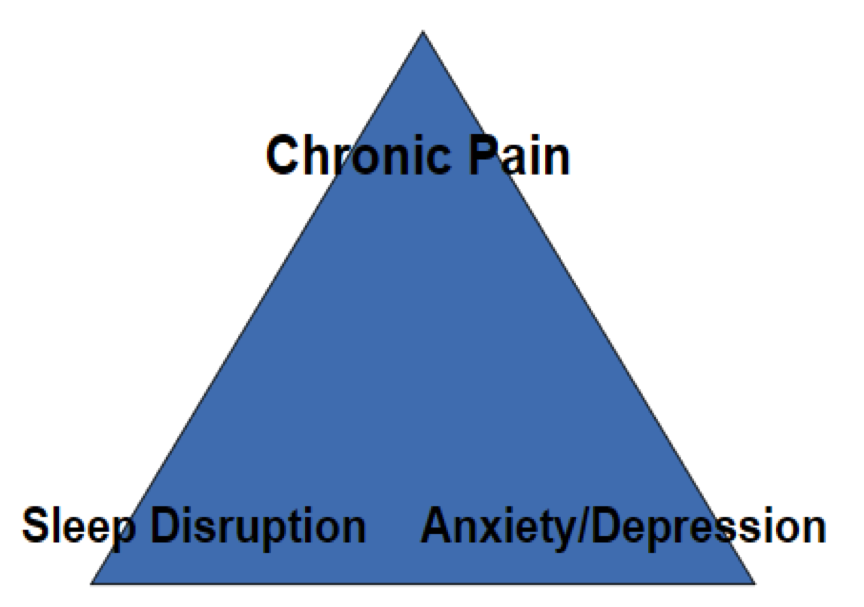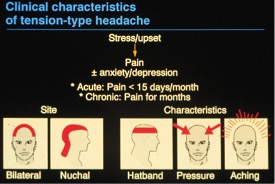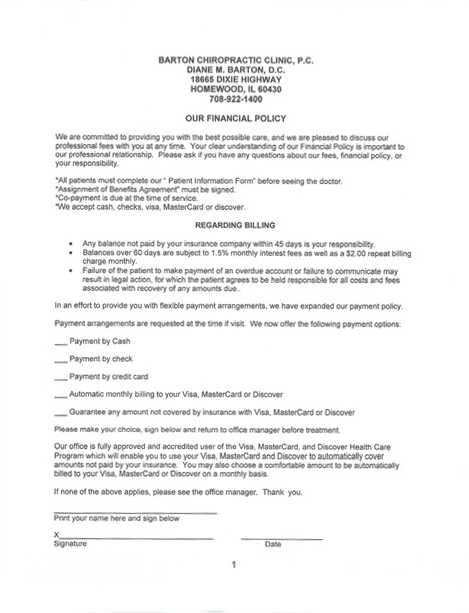Posts by adminjosh
What is Ergonomics?
The scientific discipline concerned with the understanding of interactions among humans and other elements of a system, and the profession that applies theory, principles, methods and data to design in order to optimize human well-being and overall system performance.
Ergonomics means: “fitting the job to the worker” from the Greek, Ergo = Work and Nomos = Laws
What are Work-Related Musculoskeletal Disorders (WMSD)?
- WMSDs are soft tissue injuries which occur gradually, also known as:
- Cumulative Trauma Disorders (CTDs)
- Repetitive Strain Injuries (RSIs)
- Overuse injuries
What are Ergonomic Conditions?
Disorders of the soft tissue – specifically: Muscles, nerves, tendons, ligaments, joints, cartilage, blood vessels, spinal discs.
What Are Some of the Symptoms of WMSDs? Discomfort, pain, numbness, tingling, inflammation, burning, swelling, change in color, tightness, loss of flexibility, discomfort, pain, numbness.
What Can Cause Symptoms of WMSDs? Heavy, frequent or awkward lifting, pushing, pulling or carrying loads, working in awkward postures, hand intensive work, vibration, contact stress.
Risk of injury depends upon: duration of exposure, frequency of exposure, intensity of exposure, or a combinations of risk factors.
Risk factors for maximum lifting: There are only recommendations for the maximum weight a person can lift.
Frequent lifting: A little more than twice per minute.
Awkward lifting: Lifting above the shoulders, below the knees, or at arm’s length. Lifting above the shoulders, below the knees, or at arm’s length.
Risk Factors for WMSDs: Awkward Postures are squatting, kneeling, bending.
Reducing Low Work: Raise and/or tilt the work for better access, use a stool for ground level work, use tools with longer handles, alternate between bending, kneeling, sitting and squatting.
Reducing Reaching: Keep items within close reach, design reach distance for the shortest worker, , emove obstacles, use gravity feed racks.
Risk Factors for WMSDs: Hand Intensive Work
Hand Intensive Work: Highly Repetitive Work
Making the same motion repeatedly can cause a lot of wear and tear on the joints being used, and if you don’t rest to allow time for them to heal, the damage can just keep building up.
Reducing Repetition: Arrange work to avoid unnecessary motions, let power tools and machinery do the work, spread repetitive work out during the day, take stretch pauses, rotate task with co-workers if possible, change hands or motions frequently.
Your grip strength decreases when you: bend your wrists, pick up slippery items, wear poorly fitting gloves, have cold hands.
Recognition and Reporting Signs and Symptoms
Report signs or symptoms if:
- Pain is persistent, severe or worsening
- Pain radiates
- Symptoms include numbness or tingling
- Symptoms keep you from sleeping at night
- Fingers blanch or turn white
Why Is It Important to Report Signs and Symptoms Early? Acute injuries can easily become chronic injuries and can sometimes lead to disability, even surgery. Early treatment save time and money. It’s important for your own health to report symptoms as early as you can.
Getting Involved! Look at your job, come up with solutions, work with solutions. Take part in training. Take responsibility for changing the way you do your job. Help to make sure efforts are successful!
5 Key Points to Remember:
- Ergonomics can help you on your job
- WMSDs can happen in jobs with risk factors
- Risk factors can be reduced and WMSDs prevented
- Reporting signs and symptoms early is important
- You can help your company put ergonomics changes into place
Sleep & Fibromyalgia
Compliance Officers
Barton Chiropractic Clinic
18665 Dixie Highway
Homewood, Illinois 60430
Office: 708-922-1400
Fax: 708-922-1451
Compliance Officer Information
The individuals listed below are Barton Chiropractic Clinic’s Medicare/Office of Inspector General (OIG) and HIPAA Privacy Compliance Officers.
Dr. Diane M. Barton, DC, MCSP, CIC
Office: 708-922-1400
Cell: 708-268-9064
Email: DrDiane2@ATT.Net
Jim Minx, MCSP, CIC
Office: 708-922-1400
Cell: 708-514-1967
Email: Jim@MedComSpec.Net
Please contact Dr. Diane M. Barton or Jim Minx any time you have a question, issue or concern regarding a compliance or privacy matter.
You may also contact
For Medicare Issues
U.S. Department of Health and Human Services
Office of Inspector General
ATTN: OIG HOTLINE OPERATIONS
PO Box 23489
Washington D.C. 28026
For HIPAA Privacy or Other HIPAA Related Issues
Office of Civil Rights
https://ocrportal.hhs.gov/ocr/smartscreen/main.jsf
Headaches
Are Headaches Normal?
Many people believe that it is okay to have headaches. Some even think that headaches are normal. This can be a dangerous misconception as headaches can be an important warning sign that something else may be wrong.
According to a study by the Mayo Clinic, headaches are the 9th most common reason patients see a doctor. The World Health Organization estimates that 50-75% of adults have had a headache in the last year and 30% or more have reported a migraine. In the Global Burden of Disease Study, updated in 2013, headache disorders were the 3rd highest cause of years lost due to disability.
Many people who regularly have headaches reach for medication to relieve the pain. They often develop dependencies on these medications, which have harmful side effects over time such as stomach, liver or kidney problems.
- Relying upon pain numbing medications on a regular basis for headaches is not justified if you know about the latest research and treatments that are available to you. Over 70% of patients who use alternative therapies never informed their medical providers that they used such therapies? Over 70% of patients who use alternative therapies never informed their medical providers that they used such therapies?
Common headache types include: Migraine, Tension Type, Cervicogenic
Migraine: Contrary to popular belief, migraine is not just a bad headache. It’s an extremely incapacitating collection of neurological symptoms that usually includes a severe throbbing recurring pain on one side of the head. It’s often accompanied by nausea, vomiting and extreme sensitivity to light and sound.
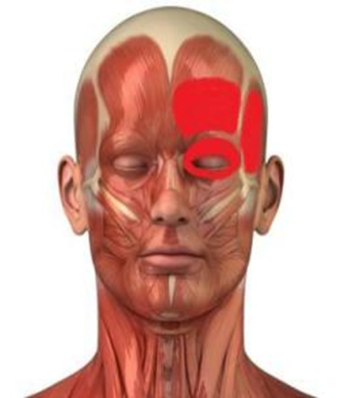
What Happens During a Migraine?
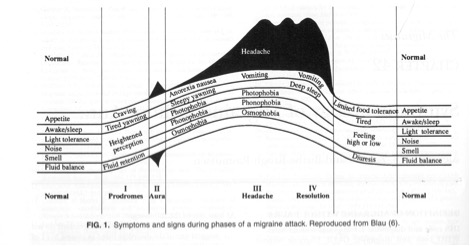
22% of the participants reported more than a 90% reduction of their migraines.
50% more participants reported significant improvement in the intensity of the migraines.
After one week of treatment 75% of the subjects reported complete relief of headache.They also noted a significant increase in cervical ROM and a reduction of dizziness.
“Spinal manipulation was as effective as a well established and efficacious treatment (amitriptyline), and on the basis of a benign side effects profile, it should be considered a treatment option for patients with frequent migraine headaches.
Tension-type headaches are the most common form of headache, occurring in about three-quarters of the general population. Tension-type headache is usually described as a pain that feels like a tight band round your head or a weight on top of it. Your neck or shoulder muscles may also hurt along with the headache.
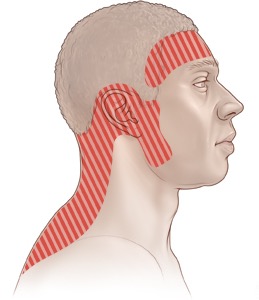
TENSION TYPE HEADACHES
- Female:Male – 60:40
- Lateralization – diffuse bilateral
- Location – diffuse
- Frequency – 1-30 per month
- Severity – mild/moderate
- Duration – days to weeks
- Pain Character – dull
- Triggers – multiple, neck movement not typical
- Associated Symptoms – occasionally decreased appetite, phonophobia or photophobia
Spinal manipulation is an effective treatment for Tension Headaches. Amitriptyline was slightly more effective in reducing pain at the end of the treatment period but was associated with more side effects.
In addition…Four weeks after the cessation of treatment, the patients who received spinal manipulative therapy (SMT) experienced a sustained therapeutic benefit in all major outcomes in contrast to patients that received amitriptyline, who reverted to baseline values. And the sustained therapeutic benefit with SMT seemed to result in a decreased need for over the counter medication.
Almost without exception, chiropractic manipulation of the neck was found to be superior in terms of reducing tension headache frequency, intensity, and improving functional status of patients when compared to other standard medical treatments.
CERVICOGENIC HEADACHES
A cervicogenic headache starts in the cervical spine—your neck. Sometimes these headaches mimic migraine headache symptoms. Initially, pain may begin intermittently, spread to one side of the head, and become almost continuous. Pain can be exacerbated by neck movement or a particular neck position (e.g., eyes focused on a computer monitor).
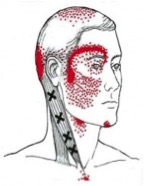
- Lateralization – unilateral without sideshift
- Location – occipital to frontoparietal and orbital
- Frequency – chronic, episodic
- Severity – chronic, episodic
- Duration – 1 hour to weeks
- Pain Character – non-throbbing, and non-lancinating pain, usually starts in neck
- Triggers – neck movement and posture, limited ROM, pressure over C0-C3
- Associated Symptoms – usually absent or similar to migraine but milder, decreased ROM
110 participants with cervicogenic headache were randomized to receive both cervical and thoracic spinal manipulation, or combined mobilization and exercise. The findings indicated that manipulation was more effective at reducing headache intensity and disability. Additionally, the manipulation group experienced significantly reduced duration and frequency of headaches.
Evidence suggests that chiropractic care, including spinal manipulation, improves migraine and cervicogenic headaches.

HEADACHES AT A GLANCE
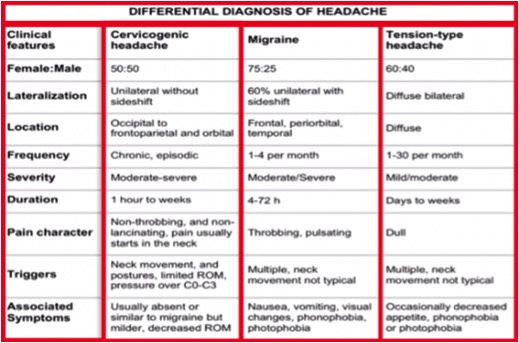
Spinal manipulation has been proven effective for many types of headaches and it does not involve medication to cover up the pain. Doctors of chiropractic are well educated in this field and can also diagnose the condition to recommend the most effective treatment, which typically includes exercise and nutrition.
HEALTHY ERGONOMICS
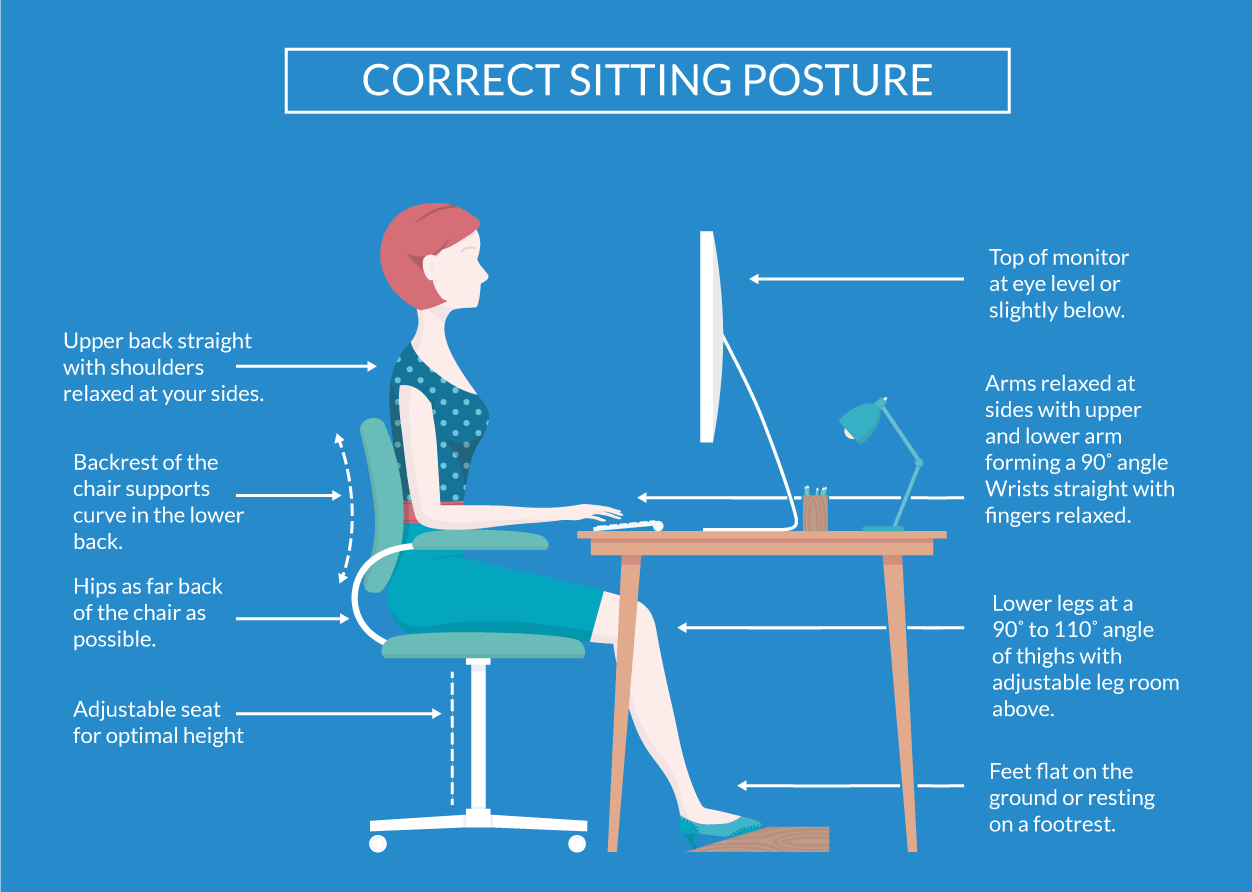
If you have headaches, be sure to check with a health professional for a thorough evaluation.
The best approach is to not develop the problem in the first place.
Take preventive steps:
- Maintain proper body weight
- Exercise regularly
- Each nutritious food
- Reduce stress
- Practice healthy ergonomics
- Maintain proper posture and spinal function
ion
HIPAA Notice
Barton Chiropractic Clinic
18665 Dixie Hwy, Homewood, IL 60430
Telephone: (708) 922-1400
HIPAA NOTICE OF PRIVACY PRACTICES
PLEASE REVIEW THIS NOTICE CAREFULLY. IT DESCRIBES HOW YOUR MEDICAL INFORMATION MAY BE USED AND DISCLOSED AND HOW YOU MAY GAIN ACCESS TO THAT INFORMATION.
POLICY STATEMENT
This Practice is committed to maintaining the privacy of your protected health information (“PHI”), which includes information about your medical condition and the care and treatment you receive from the Practice and other health care providers. This Notice details how your PHI may be used and disclosed to third parties for purposes of your care, payment for your care, health care operations of the Practice, and for other purposes permitted or required by law. This Notice also details your rights regarding your PHI.
USE OR DISCLOSURE OF PHI
The Practice may use and/or disclose your PHI for purposes related to your care, payment for your care, and health care operations of the Practice. The following are examples of the types of uses and/or disclosures of your PHI that may occur. These examples are not meant to include all possible types of use and/or disclosure.
- Care – In order to provide care to you, the Practice will provide your PHI to those health care professionals directly involved in your care so they may understand your medical condition and needs and provide advice or treatment. For example, your physician may need to know how your condition is responding to the treatment provided by the Practice.
- Payment – In order to get paid for some or all of the health care provided by the Practice, the Practice may provide your PHI, directly or through a billing service, to appropriate third party payers, pursuant to their billing and payment requirements. For example, the Practice may need to provide your health insurance carrier with information about health care services you received from the Practice so the Practice may be properly reimbursed.
- Health Care Operations – In order for the Practice to operate in accordance with applicable law and insurance requirements and in order for the Practice to provide quality and efficient care, it may be necessary for the Practice to compile, use and/or disclose your PHI. For example, the Practice may use your PHI in order to evaluate the performance of the Practice’s personnel in providing care to you.
Note: Genetic information is protected by law and is not considered part of Health Care Operations.
§ Fundraising – To the extent that the Practice engages in fundraising activities (i.e. appeals for money, help, or event sponsorships), certain types of PHI may be disclosed for these purposes, unless you specifically ‘opt out’ of receiving notification. To ‘opt out’, call or email the Practice to be excluded from fundraising campaigns.
AUTHORIZATION NOT REQUIRED
The Practice may use and/or disclose your PHI, without a written Authorization from you, in the following instances:
1. De-identified Information – Your PHI is altered so that it does not identify you and, even without your name, cannot be used to identify you.
2. Business Associate – To a business associate, who is someone the Practice contracts with to provide a service necessary for your treatment, payment for your treatment and/or health care operations (e.g., billing service or transcription service). The Practice will obtain satisfactory written assurance, in accordance with applicable law, that the business associate and their subcontractors will appropriately safeguard your PHI.
3. Personal Representative – To a person who, under applicable law, has the authority to represent you in making decisions related to your health care.
4. Public Health Activities – Such activities include, for example, information collected by a public health authority, as authorized by law, to prevent or control disease, injury or disability. This includes reports of child abuse or neglect.
5. Federal Drug Administration – If required by the Food and Drug Administration to report adverse events, product defects, problems, biological product deviations, or to track products, enable product recalls, repairs or replacements, or to conduct post marketing surveillance.
6. Abuse, Neglect or Domestic Violence – To a government authority, if the Practice is required by law to make such disclosure. If the Practice is authorized by law to make such a disclosure, it will do so if it believes the disclosure is necessary to prevent serious harm or if the Practice believes you have been the victim of abuse, neglect or domestic violence. Any such disclosure will be made in accordance with the requirements of law, which may also involve notice to you of the disclosure.
7. Health Oversight Activities – Such activities, which must be required by law, involve government agencies involved in oversight activities that relate to the health care system, government benefit programs, government regulatory programs and civil rights law. Those activities include, for example, criminal investigations, audits, disciplinary actions, or general oversight activities relating to the community’s health care system.
8. Family and Friends – Unless expressly prohibited by you, the Practice may disclose PHI to a member of your family, a relative, a close friend or any other person you identify, as it directly relates to that person’s involvement in your health care. If you do not express an objection or are unable to object to such a disclosure, we may disclose such information, as necessary, if we determine that it is in your best interest based on our professional judgment.
9. Judicial and Administrative Proceeding – For example, the Practice may be required to disclose your PHI in response to a court order or a lawfully issued subpoena.
10. Law Enforcement Purposes – In certain instances, your PHI may have to be disclosed to a law enforcement official for law enforcement purposes. Law enforcement purposes include: (1) complying with a legal process (i.e., subpoena) or as required by law; (2) information for identification and location purposes (e.g., suspect or missing person); (3) information regarding a person who is or is suspected to be a crime victim; (4) in situations where the death of an individual may have resulted from criminal conduct; (5) in the event of a crime occurring on the premises of the Practice; and (6) a medical emergency (not on the Practice’s premises) has occurred, and it appears that a crime has occurred.
11. Coroner or Medical Examiner – The Practice may disclose your PHI to a coroner or medical examiner for the purpose of identifying you or determining your cause of death, or to a funeral director as permitted by law and as necessary to carry out its duties.
12. Organ, Eye or Tissue Donation – If you are an organ donor, the Practice may disclose your PHI to the entity to whom you have agreed to donate your organs.
13. Research – If the Practice is involved in research activities, your PHI may be used, but such use is subject to numerous governmental requirements intended to protect the privacy of your PHI such as approval of the research by an institutional review board, the de-identification of your PHI before it is used, and the requirement that protocols must be followed. Individuals have the option to ‘opt out’ of certain types of research activities.
14. Avert a Threat to Health or Safety – The Practice may disclose your PHI if it believes that such disclosure is necessary to prevent or lessen a serious and imminent threat to the health or safety of a person or the public and the disclosure is to an individual who is reasonably able to prevent or lessen the threat.
15. Specialized Government Functions – When the appropriate conditions apply, the Practice may use PHI of individuals who are Armed Forces personnel: (1) for activities deemed necessary by appropriate military command authorities; (2) for the purpose of a determination by the Department of Veteran Affairs of eligibility for benefits; or (3) to a foreign military authority if you are a member of that foreign military service. The Practice may also disclose your PHI to authorized federal officials for conducting national security and intelligence activities including the provision of protective services to the President or others legally authorized.
16. Inmates – The Practice may disclose your PHI to a correctional institution or a law enforcement official if you are an inmate of that correctional facility and your PHI is necessary to provide care and treatment to you or is necessary for the health and safety of other individuals or inmates.
17. Workers’ Compensation – If you are involved in a Workers’ Compensation claim, the Practice may be required to disclose your PHI to an individual or entity that is part of the Workers’ Compensation system.
18. Disaster Relief Efforts – The Practice may use or disclose your PHI to a public or private entity authorized to assist in disaster relief efforts.
19. Marketing – Face to face communication directly with the patient, treatment and coordination of care activities, refill reminders or communications about drugs that have already been prescribed, or promotional gifts of nominal value do not require authorization as long as the Practice receives no financial remuneration for making the communication. All other situations require separate authorization.
20. Required by Law – If otherwise required by law, but such use or disclosure will be made in compliance with the law and limited to the requirements of the law.
AUTHORIZATION
Uses and/or disclosures, other than those described above, will be made only with your written Authorization. These authorizations may be revoked at any time, however, we cannot take back disclosures already made with your permission.
We also will NOT use or disclose your PHI for the following purposes, where applicable, without your express written Authorization:
- Marketing – This does not including marketing communications described in item #19. The Practice will obtain prior authorization before disclosing PHI in connection with marketing activities in which financial remuneration is received.
- Sales – The Practice may receive payment for sharing your information in specific situations (i.e. public health purposes or specific research projects – see #12 above).
- Specially protected information – Certain types of information such as psychotherapy notes, HIV status, substance abuse, mental health, and genetic testing information require their separate written authorization for the purposes of treatment, payment or healthcare operations.
APPOINTMENT REMINDER
The Practice may, from time to time, contact you to provide appointment reminders. The reminder may be in the form of a letter or postcard. The Practice will try to minimize the amount of information contained in the reminder. The Practice may also contact you by phone and, if you are not available, the Practice will leave a message for you.
TREATMENT ALTERNATIVES/BENEFITS
The Practice may, from time to time, contact you about treatment alternatives it offers, or other health benefits or services that may be of interest to you.
YOUR RIGHTS
You have the right to:
- Revoke any Authorization, in writing, at any time. To request a revocation, you must submit a written request to the Practice’s Privacy Officer. Marketing revocations may be submitted to the Practice via telephone or email.
- Request restrictions on certain use and/or disclosure of your PHI as provided by law. However, the Practice is not obligated to agree to any requested restrictions. To request restrictions, you must submit a written request to the Practice’s Privacy Officer. In your written request, you must inform the Practice of what information you want to limit, whether you want to limit the Practice’s use or disclosure, or both, and to whom you want the limits to apply. If the Practice agrees to your request, the Practice will comply with your request unless the information is needed in order to provide you with emergency treatment.
- Restrict disclosures to your health plan when you have paid out-of-pocket in full for health care items or services provided by the Practice.
- Receive confidential communications of PHI by alternative means or at alternative locations. You must make your request in writing to the Practice’s Privacy Officer. The Practice will accommodate all reasonable requests.
- Inspect and copy your PHI as provided by law. To inspect and copy your PHI, you must submit a written request to the Practice’s Privacy Officer. In certain situations that are defined by law, the Practice may deny your request, but you will have the right to have the denial reviewed. The Practice may charge you a fee (to cover costs incurred by the Practice to reproduce records) for the cost of copying, mailing or other supplies associated with your request.
- Amend your PHI as provided by law. To request an amendment, you must submit a written request to the Practice’s Privacy Officer. You must provide a reason that supports your request. The Practice may deny your request if it is not in writing, if you do not provide a reason in support of your request, if the information to be amended was not created by the Practice (unless the originating individual or entity that created the information is no longer available), if the information is not part of your PHI maintained by the Practice, if the information is not part of the information you would be permitted to inspect and copy, and/or if the information is accurate and complete. If you disagree with the Practice’s denial, you have the right to submit a written statement of disagreement.
- Receive an accounting of non-routine disclosures of your PHI as provided by law. To request an accounting, you must submit a written request to the Practice’s Privacy Officer. The request must state a time period which may not be longer than six years and may not include the dates before April 14, 2003. The request should indicate in what form you want the list (such as a paper or electronic copy). The first list you request within a 12 month period will be free, but the Practice may charge you for the cost of providing additional lists in that same 12 month period. The Practice will notify you of the costs involved and you can decide to withdraw or modify your request before any costs are incurred.
- Receive a paper copy of this Notice of Privacy Practices from the Practice upon request.
- To file a complaint with the Practice, please contact the Practice’s Privacy Officer. All complaints must be in writing. If your complaint is not satisfactorily resolved, you may file a complaint with the Secretary of Health and Human Services, Office for Civil Rights. Our Privacy Officer will furnish you with the address upon request.
- To obtain more information, or have your questions about your rights answered, please contact the Practice’s Privacy Officer.
PRACTICE’S REQUIREMENTS
The health care office:
- Is required by law to maintain the privacy of your PHI and to provide you with this Notice of Privacy Practices upon request.
- Is required to abide by the terms of this Notice of Privacy Practices.
- Reserves the right to change the terms of this Notice of Privacy Practices and to make the new Notice of Privacy Practices provisions effective for all of your PHI that it maintains.
- Will not retaliate against you for making a complaint.
- Must make a good faith effort to obtain from you an Acknowledgment of receipt of this Notice.
- Will post this Notice of Privacy Practices in its lobby and on the Practice’s web site, if the Practice maintains a Web site.
- Will inform you in a timely manner, if there is a case of a breach of unsecured health information.
Form Copyright © 2013 by InstaCode Institute.
Form may only be copied and/or customized by the owner of this book for use in his/her own office.
Diane Barton, D.C.
1987 Graduate of Palmer College of Chiropractic, Davenport, IA.
Dr. Barton is a native of the south suburbs having grown up, lived and worked in the area her entire life. She graduated from Southern Illinois University in Carbondale, Illinois with a Bachelors degree in English. Dr. Barton went onto study chiropractic care at Palmer College of Chiropractic in Davenport, Iowa. Graduation from Palmer in 1987, she began her practice here in the south suburbs. She currently has an office in Homewood.
Dr. Barton’s philosophy of chiropractic care for her patients is to find the true problem for the pain or reason for the loss of function, fix it then leave it alone. Dr. Barton treats patients in the shortest amount of time without sacrificing patient care and without unnecessary treatments. She works within the regulations of patient care. Through the use of various natural chiropractic manipulation treatment techniques (CMT) rather than using over-the-counter or prescription medications which may just mask the pain and the problem, Dr. Barton actually is working on correcting the root cause of the pain.
Dr. Barton’s practice is family friendly with patients ranging from pregnant women to babies to senior citizens on Medicare. No matter the patient, Dr. Barton’s care and attention remains the same.
So, you have never had chiropractic care before and are wondering what is it? Chiropractic is the manipulation by hand of the spine to affect the nerves and muscles. This includes the disks and overall alignment of the spine.
Though chiropractic care is not considered to be pain therapy, many people mistake pain as the problem when in reality pain is a warning that something within the body is not correct.
The pain a person may feel is only a signal or symptom of a more serious issue or problem. The use of painkillers many times only lessens the pain allowing the actual problem to continue to progressively worsen as the body begins to break down further through proper chiropractic care people have been able to find relief from pain after suffering for years
As a chiropractor, Dr. Barton has been able to help many individuals with the following health issues:
- Chiropractic pain due to generative disks
- Headache and migraine headaches
- Hip pain and hip misalignment
- Lower back pain and immobility
- No pain or stiffness
- Due to pinched nerves new paragraph static nerve pain
- Spinal misalignment correction
Dr. Barton also utilizes massage therapy to relieve pain and correct muscle tissues. Treatment includes rehab exercises to improve patients function
- Disk rehab
- Balance and fall prevention
- Activities of daily living functional improvement
- Posture correction
Health History Form
We ask that all of our new patients fill out this Health History Form before their first visit.
Health History Form:
Rehabilitation
Through the use of various stretches and exercises, rehabilitation is used to strengthen the parts of body that influence posture and movement. It is through practicing rehabilitation that we aim to correct poor posture and imbalanced movements in a way the completely resolves the problem as well as minimizing the chance of their reoccurring in the future.
Barton Chiropractic Privacy Policy
Notice of Privacy Practices
This notice describes how medical information about you may be used and disclosed and how you can get access to that information. Please review this notice carefully.
This Practice is committed to maintaining the privacy of your protected health information (“PHI”), which includes information about your health condition and the care and treatment you receive from the Practice. The creation of a record detailing the care and services you receive helps this office to provide you with quality health care. This Notice details how your PHI may be used and disclosed to third parties. This Notice also details your rights regarding your PHI. The privacy of PHI in patient files will be protected when the files are taken to and from the Practice by placing the files in a box or brief case and kept within the custody of a doctor or employee of the Practice authorized to remove the files from the Practice’s office. It may be necessary to take patient files to a facility where a patient is confined or to a patient’s home where the patient is to be examined or treated. If you have further questions, please contact the compliance officer, Diane M. Barton, D.C.
No Consent Required
The Practice may use and/or disclose your PHI for the purposes of:
(a) Treatment – In order to provide you with the health care you require, the Practice will provide your PHI to those health care professionals, whether on the Practice’s staff or not, directly involved in your care so that they may understand your health condition and needs. For example, a physician treating you for a condition or disease may need to know the results of your latest physician examination by this office.
(b) Payment – In order to get paid for services provided to you, the Practice will provide your PHI, directly or through a billing service, to appropriate third party payors, pursuant to their billing and payment requirements. For example, the Practice may need to provide the Medicare program with information about health care services that you received from the Practice so that the Practice can be properly reimbursed. The Practice may also need to tell your insurance plan about treatment you are going to receive so that it can determine whether or not it will cover the treatment expense.
(c) Health Care Operations – In order for the Practice to operate in accordance with applicable law and insurance requirements and in order for the Practice to continue to provide quality and efficient care, it may be necessary for the Practice to compile, use and/or disclose your PHI. For example, the Practice may use your PHI in order to evaluate the performance of the Practice’s personnel in providing care to you.
1. The Practice may use and/or disclose your PHI, without a written Consent from you, in the following additional instances:
(a) De-identified Information – Information that does not identify you and, even without your name, cannot be used to identify you.
(b) Business Associate – To a business associate if the Practice obtains satisfactory written assurance, in accordance with applicable law, that the business associate will appropriately safeguard your PHI. A business associate is an entity that assists the Practice in undertaking some essential function, such as an associate doctor, billing company or massage therapist that assists the office in submitting claims for payment to insurance companies or other payers.
(c) Personal Representative -To a person who, under applicable law, has the authority to represent you in making decisions related to your health care
(d) Emergency Situations:
(i) For the purpose of obtaining or rendering emergency treatment to you provided that the Practice attempts to obtain your Consent as soon as possible; or
(ii) To a public or private entity authorized by law or by its charter to assist in disaster relief efforts, for the purpose of coordinating your care with such entities in an emergency situation.
(e) Communication Barriers – If, due to substantial communication barriers or inability to communicate, the Practice has been unable to obtain your Consent and the Practice determines, in the exercise of its professional judgment, that your Consent to receive treatment is clearly inferred from the circumstances.
(f) Public Health Activities – Such activities include, for example, information collected by a public health authority, as authorized by law, to prevent or control disease and that does not identify you and, even without your name, cannot be used to identify you.
(g) Abuse, Neglect or Domestic Violence – To a government authority if the Practice is required by law to make such disclosure; if the Practice is authorized by law to make such a disclosure, it will do so if it believes that the disclosure is necessary to prevent serious harm
(h) Health Oversight Activities – Such activities, which must be required by law, involve government agencies and may include, for example, criminal investigations, disciplinary actions, or general oversight activities relating to the community’s health care system.
(i) Judicial and Administrative Proceeding – For example, the Practice may be required to disclose your PHI in response to a court order or a lawfully issued subpoena.
(j) Law Enforcement Purposes – In certain instances, your PHI may have to be disclosed to a law enforcement official. For example, your PHI may be the subject of a grand jury subpoena. Or, the Practice may disclose your PHI if the Practice believes that your death was the result of criminal conduct.
(k) Coroner or Medical Examiner – The Practice may disclose your PHI to a coroner or medical examiner for the purpose of identifying you or determining your cause of death.
(l) Organ, Eye or Tissue Donation – If you are an organ donor, the Practice may disclose your PHI to the entity to whom you have agreed to donate your organs.
(m) Research – If the Practice is involved in research activities, your PHI may be used, but such use is subject to numerous governmental requirements intended to protect the privacy of your PHI and that does not identify you and, even without your name, cannot be used to identify you.
(n) Avert a Threat to Health or Safety – The Practice may disclose your PHI if it believes that such disclosure is necessary to prevent or lessen a serious and imminent threat to the health or safety of a person or the public and the disclosure is to an individual who is reasonably able to prevent or lessen the threat.
(o) Workers’ Compensation – If you are involved in a Workers’ Compensation claim, the Practice may be required to disclose your PHI to an individual or entity that is part of the Workers’ Compensation system.
What is Chiropractic
Chiropractic is a health care profession that focuses on treatment of disorders within the musculoskeletal and nervous systems. Muscular, nervous, and skeletal problems are among the symptoms treated by chiropractic care.
Chiropractors specialize in correcting spinal misalignment. These misalignments of the spine are called subluxations. Often chiropractors manipulate the spine and various parts of the body by hand using specific procedures. Chiropractors also use conventional diagnostic tests such as MRIs, X-Rays, and lab work to provide treatment for their patients. Chiropractic treatment may also include:
- Electrotherapy
- Ice/heat therapy
- Therapeutic exercise
- Therapeutic ultrasound
- Lifestyle counseling
- Massage therapy
- Nutritional counseling
- Physical rehabilitation
- Stress management

